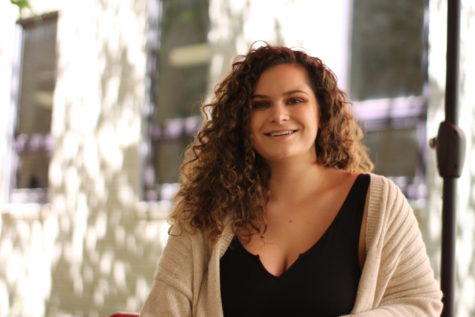The air smelled of ink on paper and the walls were completely concealed by books stacked from the floor to the ceiling. Sunlight that hadn’t been blocked by the buildings outside streamed its way into the store and made the wood floors seem to glow. I had escaped the New York cold by taking refuge with my two friends in a small, local bookstore.
The journalism convention we were attending at Columbia University was a few blocks away. As I walked towards the endless rows of books, I was surprisingly drawn to the nonfiction section. The words “Girl Up” in bold print caught my eye. The book was about dealing with subtle and everyday sexism as a young woman. After reading the description on the back, I rushed to the checkout counter.
A few days later, I was on a plane taking me back home. While everyone else was passed out from an exhausting day, I was engrossed with Girl Up. I couldn’t read fast enough. Then I came across a metaphor for feminism that instantly resonated with me. It said that the concept of feminism itself is like a lightswitch. Once you turn it on and see your surroundings, you can’t unsee them.
I began seeing my surroundings as they were. The lightswitch had finally turned on, and the world around me was illuminated.
I can’t unsee men blatantly staring at women, myself included, as if we are sexual objects. I can’t undo one of my best friends being kissed by a drunk, adult man who didn’t ask. I can’t unhear a man yelling obscenities at my mom and I as we walked back to our hotel.
I can’t unfeel the confusion and dirtiness that comes from being catcalled at 14 years old. I can’t unfeel my heart breaking when I found out one of my best friend’s mom was raped. I can’t unfeel the frustration of being told to bring a boy with me to certain places for “safety reasons”. I can’t unfeel the confusion of being told my entire life to not go into male dominated fields.
I knew the list goes on far too long, but up until that moment I had been hesitant to label myself a feminist. This hesitation is unsurprisingly common considering the scrutiny feminists face. They’re automatically labeled “feminazis” and “man-haters”. My reluctance to embrace the label I knew was right for me came from my conservative upbringing. I didn’t know it at the time, but I was scared. It felt like it was an act of rebellion to call myself a feminist.
I decided that I wanted to own it and stop being so hesitant with the f-word. I realized that by merely identifying as a feminist, I’m helping break down the walls meant to confine both women and men in our society.
Even though I’m not recognized on a large scale for my beliefs, I’m making an impact by calling out sexism when I see it and by not being afraid to talk about it.
Feminism has helped me to become a profoundly confident person. It’s helped me be unapologetically myself and to ignore those who tell me I shouldn’t because I am a woman. I’ve come to find that feminism isn’t a self-righteous woman in a pantsuit staring at you menacingly as she holds the Feminist Bible.
It’s treating yourself with the respect that the world should be giving you in the first place.
Whether it’s feminism or not, it’s important that young people find something that makes them feel confident in who they are— that makes them feel like they’re a part of something bigger than themselves.








